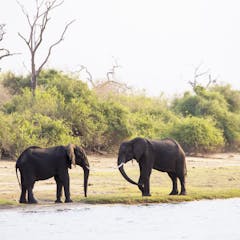
Articles on Elephants
Displaying 1 - 20 of 106 articles

Even self-proclaimed ethical tourism programs can widen economic gaps and harm communities they claim to protect. Here are a few steps you can take as an ethical tourist.

Forest elephants are endangered in Nigeria. Habitat protection, community awareness campaigns, research and stronger regulations could save them from going extinct.

Elephants can be viewed as geological engineers that create minor tectonic forces on the substrate they walk on.

A focus on financial compensation for subjects of ‘The Elephant Whisperers’ overshadowed the need to examine storytelling conventions and creative practices in contemporary documentary filmmaking.

Groundbreaking study demonstrates how behaviour drives long-term evolution over 20 million years.

Measures to address tensions between wildlife and humans are critical for Tanzania.

Any law that protects threatened wildlife should be welcomed – but a ban alone will not prevent illegal activity.

Africa’s mammals are a global treasure that must be protected.

A new study looks back into history to assess human impacts on the range of Asian elephants and finds sharp decline starting several centuries ago.

Studying fossil dung offers another avenue for scientists trying to recreate ancient landscapes.

The findings suggest that poaching rates are lower where there is strong national governance and levels of local human development are higher.

If the situation doesn’t change, Africa – indeed, the world – may lose one of its most iconic animal species.

Japan was one of the world’s largest ivory markets – research explains why the country is no longer a key destination for the product.

Changing habitat ranges, competition for food and water, and biological effects of climate change all pose threats to wildlife.

A study of tweets posted in 2019 found that tweets about elephant conservation didn’t align with the actual greatest threats to the animals, creating the risk that funding could be misdirected.

Since antiquity people have harnessed sound as a weapon, and the practice continues – in new high-tech ways – today.

Many wildlife species face an uncertain future due to recurring, severe drought.

Vale Tricia: the beloved Asian elephant called Perth Zoo home since 1963. Her death has led to an outpouring of grief in Perth, especially among zookeepers and her fellow elephants.

Thanks to our new technique using fossilised tracks, we have been able to learn more about the locomotion of the largest creatures ever to have roamed this planet.

This was the first national DNA-based assessment of any free-ranging large mammal in Africa.
